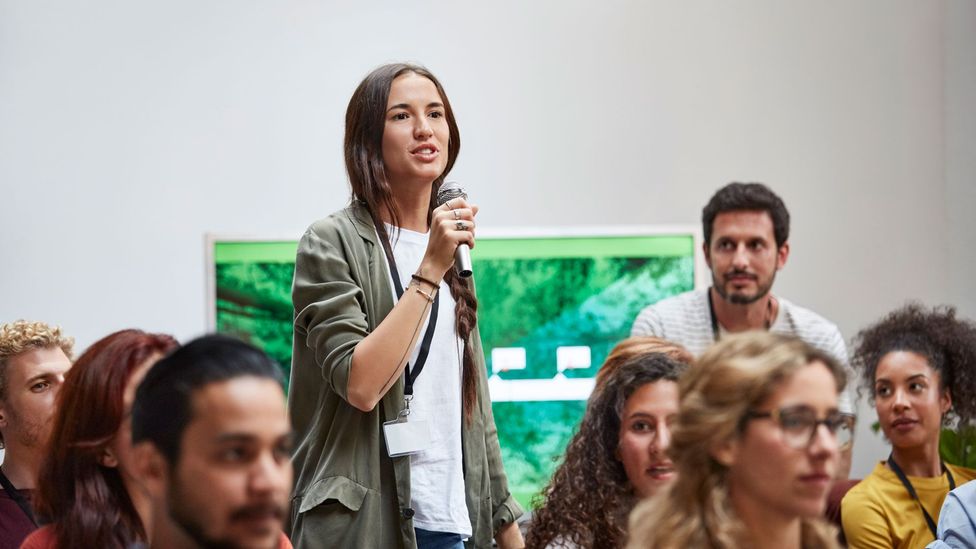Like many women, I remember watching the Me Too movement mushroom as I scrolled through Facebook and Twitter in October 2017. While the hashtag #MeToo was first used in 2006 by black feminist activist Tarana Burke, who wanted to tackle sexual violence within her own community, it gained momentum following a viral tweet by actress Alyssa Milano after Harvey Weinstein’s crimes were exposed. Women around the world also began posting about how the misuse of power and privilege enabled sexual misconduct in the workplace.
For many women in the workforce, the Me Too movement triggered conversations about the inappropriate (and often illegal) behaviours we’d encountered in our own careers, prompting a mix of anger, catharsis and, for some, painful re-lived trauma. But that wasn’t the case for Gen Z who were still children or teenagers. Born between 1996 and 2012, only the oldest, now workforce-aged, were in university, or applying for their first jobs, when #MeToo trended across social media and grabbed headlines.
“I think that for myself and the majority of my peers, we didn't quite link the movement to the workforce,” says Scott Millar, 22, who runs an ed-tech start-up in Brisbane, Australia, and is a public speaker on Gen Z’s role in the workplace. “At the time, I remember us thinking it was more about sexual harassment in Hollywood, and it was more of an issue confined to the rich and famous.” Miller only became aware of the broader impact via his teachers, and through the business conferences he began to attend as he started his company while he was still in high school.
Danielle Farage, a speaker and influencer on Gen Z and work, was still an undergraduate at the University of Southern California when the movement took off. She says her peer group was aware of Me Too’s significance from the start though, especially due to her school’s proximity to Hollywood, and subsequent allegations on her own campus. “That did raise a lot of concerns, but there was also a sense of optimism that things were going to get better for our generation as we started work,” says the now-24-year-old.
But other Zoomers failed to connect with the Me Too movement at all, says Anne Boysen, a futurist and Gen Z expert based in Austin, Texas. Some were simply “too young to have understood” the sexual crimes that Me Too campaigners were focussed on, she says. The fact that the movement grew exponentially after “a lot of privileged, mostly white, women” who were “already in high places” started voicing their concerns, also made it harder for some young people to see how it could possibly shape their own future life experiences, says Boysen.
Gen Z are now in a unique position, as the first generation to have their entire adult careers develop in a post-Me Too era. The oldest members, like Farage and Millar, are a few years into their first full-time jobs, while others are still years on from entering the workforce. But it’s tricky to measure how much companies have shifted their cultures in the wake of Me Too, and what impact this is having on Gen Z’s early career experiences.

Danielle Farage was aware of Me Too early due to her university's proximity to Hollywood (Credit: Courtesy of Danielle Farage)
Policies and paperwork
On paper, at least, young people are largely entering organisations that have become “much more conscious about the repercussions of bad behaviour at work”, says New York-based organisational psychologist and author Tomas Chamorro-Premuzic. Most large businesses now provide mandatory training designed to prevent workplace harassment, he says, and encourage employees to speak out if they experience or witness unacceptable behaviours. “I think most employees today feel more empowered that they're able to [speak out] than they were before the Me Too era,” he says.
Research suggests that Me Too has driven an increase in CEO firings for sexual misconduct, and that, compared with five years ago, workers are more confident that speaking out about sexual harassment or assault will have an impact. A 2022 study for the Pew Research Centre in the US showed that roughly seven out of 10 people polled believe bad actors are more likely to be held responsible for these types of behaviours in the workplace, and at least six out of 10 think accusers are more likely to be believed than they would have been in 2017. In a similar poll for a major union federation in England and Wales, seven out of 10 people who participated agreed that Me Too had allowed employees to be more open about sexual harassment.
There have been significant legal developments as well. In the US, a new law means that employees alleging harassment can’t be forced into confidential – rather than open – arbitration proceedings. Employers in South Korea are now legally bound to investigate any harassment claims involving their staff (including at off-site locations such as karaoke bars), while Spain has toughened its definition of consent.
Many employees themselves have also initiated changes to company culture in the wake of Me Too. This includes setting up women’s support groups and organising women-focused events, focused on tackling workplace harassment, and empowering more women to take on management positions, which research suggests can help limit workplace harassment.
I think most employees today feel more empowered that they're able to [speak out] than they were before the Me Too era – Tomas Chamorro-Premuzic
“It started a lot of creativity and a sense of ‘no taboo, no limit, everything's possible now’’,” says Imène Maharzi, a 45-year-old Paris-based start-up advisor and mentor, who founded a platform to help promote financial independence for women in 2018. She says that she felt a renewed sense of empowerment as female colleagues of all ages began pushing for change. When she started out in her career, “nobody would have ever listened if [an intern] pushed a topic on the agenda” during a team meeting. But post-Me Too, younger colleagues no longer “wait to be allowed to initiate actions and open conversations”, about topics like harassment, and work to help create better workplace experiences for future generations.
Polls also indicate that current support for the Me Too movement is even stronger among Gen Z than millennials and older generations – a sign that young people entering the workforce remain committed to its goals. The Pew Research Center study showed 64% of 18-to-29 year olds who’d heard of the movement said they supported it, with women younger than 30 showing more support for the movement than any other group.
A confusing landscape
Despite these strides, Me Too’s impact has been more muted than many of the movements advocates initially hoped.
Inappropriate workplace behaviours remain prevalent, according to polls. Almost two out of three women and about one in three men said they’d experienced sexual harassment in the workplace during the past three years, in a recent survey for US HR consultancy firm The Shift Workshop. Notably, the majority said their workplaces had offered training on the problem during the same period.
Chamorro-Premuzic says this feeds into a large body of behavioural science that suggests there is often a “gap between what people say and what they do.” In the context of Me Too, it’s clear that “not all the companies that say they want an inclusive culture and that they're not going to tolerate toxicity … actually manage to do it.”
Similarly, despite polls suggesting workers feel more confident that sexual harassers will be held to account, that doesn’t mean that everyone who’s experienced inappropriate or illegal behaviour in the workplace has felt comfortable reporting it. A 2019 survey for the Young Women’s Trust charity in the UK found that 25% of 18-to-30 year olds feared they could lose their jobs by speaking out about harassment. Academic research by several North American Universities in 2021 suggested employees remain reluctant to oppose male leaders who engage in unethical behaviours in the workplace (conversely, women tend to receive more internal pushback, a likely result of gender norms and biases).
Chamorro-Premuzic, who recently wrote the book Why Do So Many Incompetent Men Become Leaders?, says it’s also important to recognise that middle-aged men still dominate senior management. They advanced in their careers at a time when sexism was more rife and sexual misconduct was more common, he says, plus many might have been promoted for impressing their male peers, “not on the basis of whether they are competent and ethical”.

Some experts believe Gen Z are more likely to speak up about workplace issues (Credit: Getty Images)
This, argues Chamorro-Premuzic, means that there is still a significant number of leaders and employees who haven’t embraced the post-Me Too culture shift. Others, he points out, have rejected it entirely. “They feel that there is like a ‘woke’ crusade against toxic masculinity, and everybody is out to get them,” he says.
There’s also anecdotal evidence that long-standing ‘industry norms’ mean certain sectors remain more “toxic” than others, says London-based organisational psychologist Jason David Phillips. Aged 28, he offers early career stress management coaching to Gen Z workers.
During the Me Too years, he worked in public relations, where he saw first-hand how the reality of gendered workplace pressures manifests. He says employees in the PR industry have long been expected to network and “people please” with current and potential clients. This, he argues, doesn’t always result in the kind of psychological safety required for staff to feel comfortable reporting any kind of mistreatment, from sexual harassment to bullying.
Danielle Farage agrees that sexual harassment and abuse is still “widely accepted as a norm” in certain industries. She says she’s already come across it on numerous occasions during her short career in the male-dominated tech sector. A man she described as a “very high-powered executive” non-consensually touched her rear when they were on a dance floor during an industry event, she says, and told her he wanted to dance. Another time, she says, a former male superior approached her at a private party. He kissed her on the cheek twice, which she says made her feel deeply uncomfortable.
Farage argues these kinds of experiences can be confusing for a generation that’s grown up in the shadow of Me Too. Plus, it hasn’t helped that many Gen Zers also started their careers during the pandemic, so they had fewer opportunities to build a trusted network of peers or mentors. “I entered the workforce personally at a time when forced remote work was the thing. I didn't have the opportunity to go to an office,” she says. “I didn't have the opportunity to meet women who had been in the workforce longer than me to be able to talk about these things.”
I didn't have the opportunity to meet women who had been in the workforce longer than me to be able to talk about these things – Danielle Farage
Gen Zers who are starting work now may also be doing so with slightly less optimistic expectations around sexual harassment than those who started their careers immediately after the Me Too Movement peaked, suggests Chamorro-Premuzic. This is because they are aware that while some high profile figures, like Weinstein, have been punished for their crimes, they also know that plenty of others have been able to continue in their careers, despite being publicly accused of sexual misdemeanours (prompting some media to even declare that Me Too was over).
Gen Z’s fight for change
Gen Zers tend to be more committed to caring for their own mental health, says Farage, coupled with a different understanding of what constitutes an unacceptable work environment than previous generations. This means they’re more likely to leave workplaces that make them feel uncomfortable or unsafe, leading some observers to rename Gen Z "Generation Quit”. “We’re not willing to settle for that toxic nature, and we’re actually willing to take ourselves out of it and find new opportunities,” says Farage.
“Young people are acutely aware of the myriad of opportunities that are out there, and they’re not willing to tolerate a bad work environment,” agrees Miller, the Brisbane-based public speaker. Whether or not Gen Z workers experience sexual misconduct themselves, he says they’re generally “more motivated by culture and cause than a pay packet”. This means they’re less likely to simply stand by and watch if it’s clear an organisation’s actions don’t match up to their own values on issues, he argues.
But early careers coach and organisational psychologist Phillips argues there is nuance to these trends. “It's not just about the workplace culture – it's how your personality combines with it,” he says. “It's how your values, how your upbringing, how your education, all of these things together make up your experience in the workplace”.
In other words, different factors impact how comfortable or empowered people feel complaining about harassment, or quitting a job so early on in their career.
Plus, with many economies unstable in the wake of the pandemic and warnings of a global recession, not all Gen Zers have the financial means to act with their feet. This means some may stay at jobs with toxic cultures – including those where harassment is present – simply because they can’t afford to leave. “The trends on paper suggest that young people sacrifice financial benefits for [personal] growth – but there is a cost-of-living crisis,” says Philips. “Ultimately, you may feel that ‘OK, I need to pay my bills, and therefore I need to cope with this workplace’.”

Some Gen Zers are optimistic about the future of the post-Me Too workplace (Credit: Getty Images)
A mood of optimism?
Despite these challenges, there is cause for hope: many believe that in the coming years, workplace cultures will continue to improve for women and other groups who may have faced a disproportionate amount of harassment in the past.
“I would say despite all of the tough things that I've mentioned, I am very optimistic,” says Farage.
First, older millennials “who are more in touch” are now rising into senior positions, and bringing with them experiences in workplaces in both the pre- and post-Me Too era. This, believes Farage, gives them a unique perspective as they manage and collaborate with their younger peers. “As millennials and Gen Z sort of meet in the workplace, I think there's a lot of understanding and connection there of like, ‘wow, these older generations really messed it up for us – maybe we could start to repair that’,” she argues.
Plus, as growing numbers of Gen Z enter the workforce and bring their own views and habits with them – like demands for transparency, empathic leadership and a focus on mental health – Farage hopes they’ll be in an even better position than millennials to help transform organisational cultures as they rise through the ranks. “I'm excited to jump into and be a leader, because I feel like I'm able to lead from a heart-centric place, which is, I think, what the world needs more of,” she says.
Chamorro-Premuzic points out how normalised it is for Gen Z to publicly share their negative experiences online, or call people or businesses out on social media channels. So, despite some early Me Too activists facing defamation trials for publicly listing allegations of harassment and sexual against men, this isn’t putting others off from doing the same. Just last month, a French Instagram account made global headlines for accusing powerful men of harassment in the advertising industry, sparking sackings and internal investigations. As other scandals break online, these will serve as further warnings to businesses that if there’s evidence of harassment, “employees will post about it”, journalists will write about it and their reputation will be damaged, says Chamorro-Premuzic.
It’s been just more than five years since #MeToo went viral. There’s still a long way to go. Gen Zers are generally more aware of what constitutes a predatory or toxic workplaces than the generations before them, and they feel more comfortable speaking out about abusive behaviours. But the misuse of power and privilege continues, and if Gen Zers want the kind of working environments that Me Too’s protagonists called for, they’ll need to continue the movement’s work.
